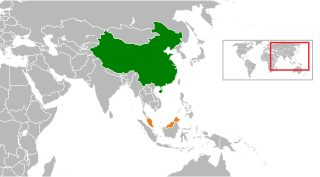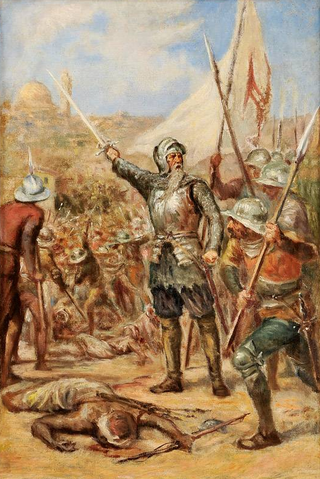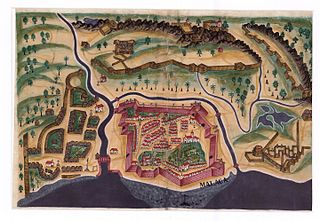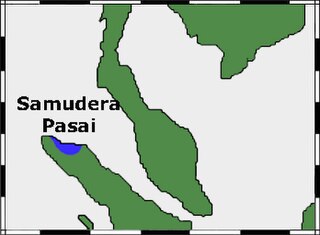
The Malacca Sultanate was a Malay sultanate based in the modern-day state of Malacca, Malaysia. Conventional historical thesis marks c. 1400 as the founding year of the sultanate by King of Singapura, Parameswara, also known as Iskandar Shah, although earlier dates for its founding have been proposed. At the height of the sultanate's power in the 15th century, its capital grew into one of the most important transshipment ports of its time, with territory covering much of the Malay Peninsula, the Riau Islands and a significant portion of the northern coast of Sumatra in present-day Indonesia.

The Zhengde Emperor, personal name Zhu Houzhao (朱厚㷖), was the 11th emperor of the Ming dynasty, reigned from 1505 to 1521. He was the Hongzhi Emperor's eldest son. Zhu Houzhao took the throne at only 14 with the era name "Zhengde", meaning "right virtue" or "rectification of virtue".

The Johor Sultanate was founded by Sultan of Malacca Mahmud Shah's son, Alauddin Riayat Shah II in 1528.
Hang Nadim was a warrior of the Johor-Riau during the Portuguese occupation of Melaka. Nadim was appointed laksamana (admiral) of Sultan Mahmud Shah's forces that harassed the Portuguese trade colonies from 1511 to 1526. He also appears as a legendary figure in a chapter of the Sejarah Melayu.
The Laluan Penarikan were a series of portage routes across the Malay Peninsula. The most famous of these routes connected the Muar River with the Pahang River. The Penarikan shortened the journey of water vessels sailing between the Strait of Malacca and the South China Sea.

China–Malaysia relations are the bilateral foreign relations between the two countries, China and Malaysia.

The Capture of Malacca in 1511 occurred when the governor of Portuguese India Afonso de Albuquerque conquered the city of Malacca in 1511.

China–Portugal relations, can be traced to 1514 during the Ming dynasty of China. Relations between the modern political entities of the People's Republic of China and the Portuguese Republic officially began on 2 February 1979. China and Portugal established the comprehensive strategic partnership in 2005. Both nations maintain friendly relations, which is due to three main reasons- the first being the Portuguese handover of Macau in 1999, the second being the Portuguese prominence in the Lusophone, which includes nations China wishes to promote relations with, and third being the extensive history of Portuguese presence in Asia.

The Battle of Duyon River was a naval engagement between the Portuguese forces commanded by Nuno Álvares Botelho, who is renowned in Portugal as one of the last great commanders of Portuguese India, and the forces of the Sultanate of Aceh, which were led by the Laksamana.
Sultan Mahmud Shah ibni Almarhum Sultan Muhammad Shah was the fifth Sultan of Pahang who reigned from 1519 to 1530. He succeeded on the death of his cousin, Mansur Shah I in 1519. His eleven years reign was marked with close relations with his namesake Mahmud Shah, the last ruler of Melaka, in supporting the latter's struggle against the Portuguese in Malacca, directly bringing Pahang into a number of armed conflicts with the European power.
Sultan Zainal Abidin Shah ibni Almarhum Sultan Mahmud Shah was the seventh Sultan of Pahang who reigned from 1540 to 1555. He succeeded on the death of his elder brother in 1540.

The Pahang Sultanate also referred as the Old Pahang Sultanate, as opposed to the modern Pahang Sultanate, was a Malay Muslim state established in the eastern Malay Peninsula in the 15th century. At the height of its influence, the sultanate was an important power in Southeast Asian history and controlled the entire Pahang basin, bordering to the north, the Pattani Sultanate, and adjoined to that of Johor Sultanate to the south. To the west, it also extended jurisdiction over part of modern-day Selangor and Negeri Sembilan.
The siege of Bintan of 1526 was a military operation in which Portuguese forces successfully sieged, assaulted and destroyed the city of Bintan, capital of the former Sultan of Malacca Mahmud Shah.
The Battle of Pago was a military operation that took place in 1520, in which Portuguese forces successfully attacked Pago, where the former Sultan of Malacca Mahmud Shah had built a fortified camp to harass Portuguese Malacca.
The Attack on Bintan in 1521 was an engagement between the Malaccans and the Portuguese who attacked the island in order to destroy Mahmud Shah of Malacca's base in Bintan, however, the attack was successfully fended off.

The Conquest of Pasai was a military campaign in 1523–1524 launched by the Sultanate of Aceh against the Samudera Pasai Sultanate and the Portuguese fortress there. The operation was a success for the Acehnese.
The Battle of Formoso River of 1615 was an naval battle that took place in the Malay Peninsula in the Formoso River, between a Portuguese fleet and a large fleet of the Sultanate of Aceh, one of the largest Aceh had ever mobilized against the Portuguese in Malacca.

Malay–Portuguese conflicts were military engagements between the forces of the Portuguese Empire and the various Malay states and dynasties, fought intermittently from 1509 to 1641 in the Malay Peninsula and Strait of Malacca.

Acehnese–Portuguese conflicts were the military engagements between the forces of the Portuguese Empire, established at Malacca in the Malay Peninsula, and the Sultanate of Aceh, fought intermittently from 1519 to 1639 in Sumatra, the Malay Peninsula or the Strait of Malacca. The Portuguese supported, or were supported, by various Malay or Sumatran states who opposed Acehnese expansionism, while the Acehnese received support from the Ottoman Empire and the Dutch East India Company.










